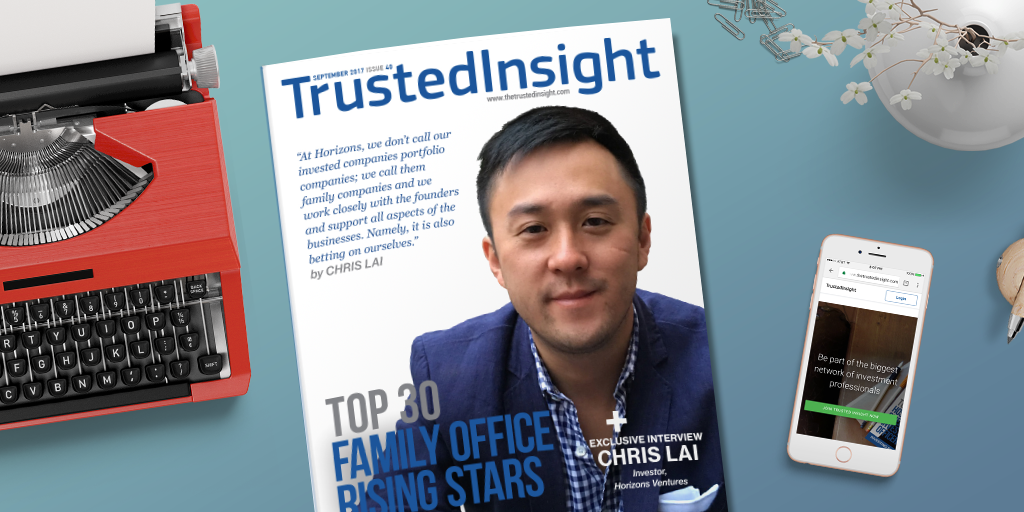Chris Lai is an investor at Horizons Ventures, a Hong Kong-based private investment firm backed by Hong Kong business tycoon Li Ka Shing. Lai manages the consumer and retail technologies portfolio for Horizons.
Horizons Ventures doesn’t disclose its total assets under managed, but the Li Ka Shing Foundation, which Horizons is closely associated with, manages a pool of $12 to $13 billion. A global investor, Lai has led more than 40 investment in the U.S., Canada, Israel, France and China. He sits on board of directors for many of his portfolio companies.
Lai, 30, joined Horizons Ventures in 2013 after founding three companies in his early twenties followed by a short career in investment banking. Prior to Horizons, Lai was an investment banker at Mooreland Partners, leading the firm’s merger and acquisition deals in technology sector. Lai holds a B.A. in neuroscience, genetics and economics from Columbia University.
Lai was recently named on Trusted Insight’s 2017 Top 30 Family Office Rising Stars. He graciously spoke with us on Aug. 25, 2017.
Trusted Insight: What's it like to work at Horizons Ventures?
Chris Lai: Horizons Ventures is the private investment arm of Mr. Li Ka Shing. On a day-to-day basis, we operate very much like other investment firms in terms of sourcing and evaluating deals, conducting due diligence and supporting portfolio companies. I am active as a board member in our retail and consumer investments.
Trusted Insight: Horizons Ventures is known for not being a trend follower in venture capital and tend to stay away from VC hot lands like Silicon Valley and mainland China. What are the thinking behind this strategy?
Chris Lai: At Horizons, we have a unique perspective – we are not as constrained as other VC firm; and we invest globally while based in Asia.
Generally, economics is at work in places and sectors where there are high concentrations of capital - it's quite common to see valuations at irrational levels. There are great opportunities and value all over the world.
Trusted Insight: You co-founded a business called DormAid in college. Was that your very first venture?
Chris Lai: I started three businesses prior to my finance career. My first company was a cross-border confectionary business, where I’d bring over products from Asia and sell them on campus.
Then when I got into Columbia University, I found that it was a unique and ideal place for a student service business in that there were 4,000 students within a two-mile radius. Given the ease of logistics, my partners and I thought it was a great opportunity to create an e-commerce business to serve students - we started with laundry and room cleaning service, and then moved on to delivering non-perishable groceries - water, snacks, etc. The value proposition is really to meet the students’ needs on campus and give them more time to focus on school and/or other activities whilst we take care of their daily chores. DormAid operated like a franchise - other schools have their own chapters.
I also co-founded a casual apparel e-commerce startup called Pique with some friends whilst I was living in New York.
Trusted Insight: You have an academic background in neuroscience. How does your education affect your decision making as an investor, whether it’s starting new companies or investing in startups?
Chris Lai: Given my academic background, I think there is a discipline ingrained in me in terms of the methodology of solving problems and doing research – the scientific method per se. To me, this is very helpful as an investor.
The actual scientific knowledge probably is not as applicable given the rapid development of different (and new) fields of study. Some fundamental science background has helped me in selected opportunities and investments where deep science was an important part of the technology or business – at least to understand and vet the concept and speak the same language so to speak.
Trusted Insight: Venture capitalists often debate over betting on founders or betting on sectors. What’s your view on that?
Chris Lai: I think there are many factors to consider when evaluating an investment such as founders, sectors (which are company-specific), technology capability and feasibility, timing (which are more market-driven), etc. Having all of them or a combination would be ideal of course. One thing is sure – investing in a company just because of one factor, however great it is, doesn’t necessarily put you on track to outsize returns.
While evaluating a company, and whether it has the right ingredients for success, is hugely important, almost equally so (and often overlooked) is the culture and rapport investors build with their portfolio after the investment. At Horizons, we don't call our invested companies portfolio companies; we call them family companies and we work closely with the founders and support all aspects of the businesses. Namely, it is also betting on ourselves.
Trusted Insight: What do you think makes a great venture capitalist?
Chris Lai: I don’t think there is one path or formula that makes a good venture capital investor. Some VCs were successful entrepreneurs, and then they turn into investors; some were finance professionals; and some are deep domain experts.
Outside of what each investor brings to the table in terms of experience and network, in my humble opinion, I think the common traits shared amongst great venture capitalists are: curiosity, empathy and a healthy dose of skepticism and clarity. The venture capitalists that I know and highly respect all love their work - they love meeting and working with entrepreneurs and companies; they're always excited to learn about new technologies and what they can and cannot do.
Trusted Insight: What readings would you recommend for venture capitalists?
Chris Lai: There is one book that I think every aspiring venture capitalist should read: Zero to One by Peter Thiel. The value of this reading to me was not so much about learning about business but learning about a way of thinking in venture capital. Other business reading I recommend: The Mind of a Strategist by Kenichi Ohmae and Security Analysis by Benjamin Graham and David Dodd.
I am a big believer in reading about more than just business literature for my work - Two books I find particularly impactful: How to Make Friends and Influence People by Dale Carnegie and Thinking Fast and Slow by Daniel Kahneman. Understanding people and yourself seems to be a good place to start.


